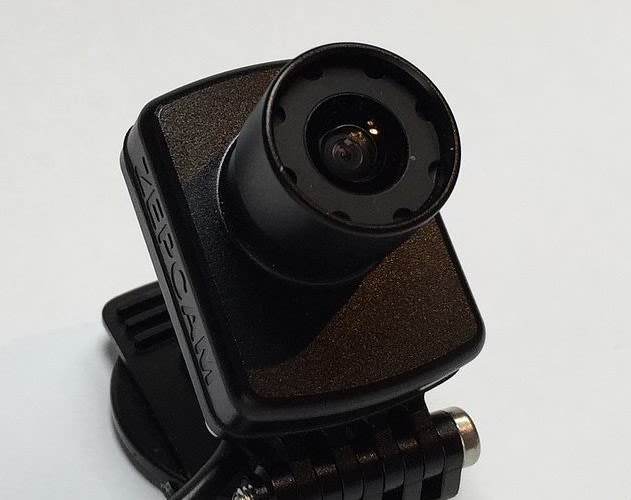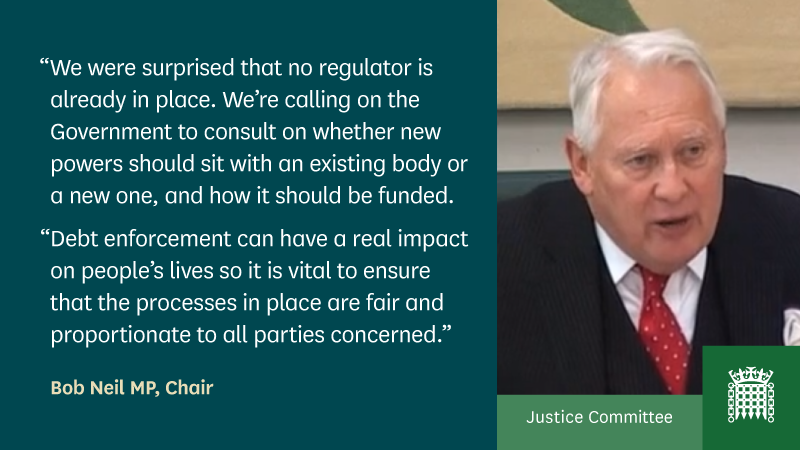Four ways to regulate bailiffs
The Government should introduce new regulation to ensure that people in debt are treated fairly, MPs say

Debt enforcement can have a real impact on people’s lives
Bailiffs (also known as enforcement agents) enforce civil court orders for the repayment of debt. This work must be carried out responsibly and fairly, balancing the rights and obligations of creditors and debtors.
It is especially important that the system protects vulnerable people and that already stressful situations are not made more difficult.
Our new report is coming out on Thurs (11th)- on bailiffs and the enforcement of debt. Watch @VictoriaPrentis talking in Feb about the importance of this inquiry pic.twitter.com/faLAgyeUzI
— Justice Committee (@CommonsJustice) April 9, 2019
We launched an inquiry into bailiffs and debt enforcement
In December 2018, the 11 MPs of the Justice Committee launched an inquiry into the bailiff industry.
We were concerned by complaints about the behaviour of bailiffs recorded by debt advice charities and by our constituents who reported bad experiences with bailiffs who had visited their homes.
We welcome the Ministry of Justice's (MOJ) own call for evidence on rogue bailiffs, which has just closed; our inquiry sits alongside this.
Read our recently published letter from Justice Minister @lucyfrazermp about the @mojgovuk call for evidence on enforcement agent reforms #bailiffs, here: https://t.co/t6GnrcSpKz pic.twitter.com/PTphxN9xH0
— Justice Committee (@CommonsJustice) December 7, 2018
Here are four ways to help fix the debt enforcement agent industry.
1. Establish an independent complaints body with a clear complaints process

Complaints are important and must be investigated properly and learned from - they should be encouraged.
But the existing complaints process is fragmented and hard to navigate. This is especially problematic given that debtors are more likely to be vulnerable and dealing with multiple difficulties in their lives, such as ill health or unemployment.
We think there should be an independent complaints body, to which all complaints about bailiffs should be escalated if the complainant has exhausted local complaints procedures (i.e. those of the organisation for which the bailiff was working).
The complaints process should be very clearly set out and have as few levels as possible so that it is easy to navigate.
2. Establish a regulator for the debt enforcement agent industry

The Government should establish a regulator for the enforcement agent industry, separate to the complaints body.
We were surprised that bailiffs are apparently so under-regulated compared with other sectors, including debt collection. The existing system of individual certification by the courts seems to be a rubber-stamping exercise.
The regulator should be able to stop unfit enforcement agents and companies from practising. It should have the power to set intermediate sanctions such as fines for poor behaviour. An appeal mechanism should be built in. This regulator should also work to change culture and raise standards (for example, by dissemination of good practice and supporting continuing professional development).
It should work closely with the complaints body, for example, sharing information about good practice.
The MOJ should consult widely on where this regulatory responsibility should sit, whether in an existing body or a new body, and how it should be funded.
3. Have the new regulator regularly review fees

We welcome the MOJ’s work to evaluate debt recovery rates, since it is important that as much debt as possible is collected without expensive bailiff visits or the pain of the seizure and sale of personal goods.
The fee structure deserves close attention, since it has not been properly reviewed or updated since its introduction in 2014, despite a Government commitment at the time to do so annually in the light of Consumer Price Index (CPI) inflation.
Equally, given that these fees are paid by some of the poorest people in society, it is also vital that the fees are proportionate.
The new regulator should regularly review and make expert recommendations to the MOJ about the fixed fee structure set out in The Taking Control of Goods (Fees) Regulations 2014.
4. Make body-worn cameras mandatory when visiting homes and businesses

This would protect both the agent and debtor alike.
Technology has moved on since the National Standards were produced in 2014. We were struck by the Local Government and Social Care Ombudsman's evidence that they had not found fault with the agent’s behaviour in a single case where the enforcement agent was wearing a body-worn camera.
Body-worn cameras would help to make it easier to investigate complaints. We also recommend that the regulator produce good practice on their use.
The Government must now respond to our report

We are giving these recommendations to the Government as the Justice Committee, 11 MPs from different political parties.
The Government has two months to respond to our report. To read more depth and detail about our recommendations, read our report on Bailiffs: Enforcement of debt and find out more about this inquiry on our website.
If you're interested in the work of our committee, find out more about our other inquiries.
